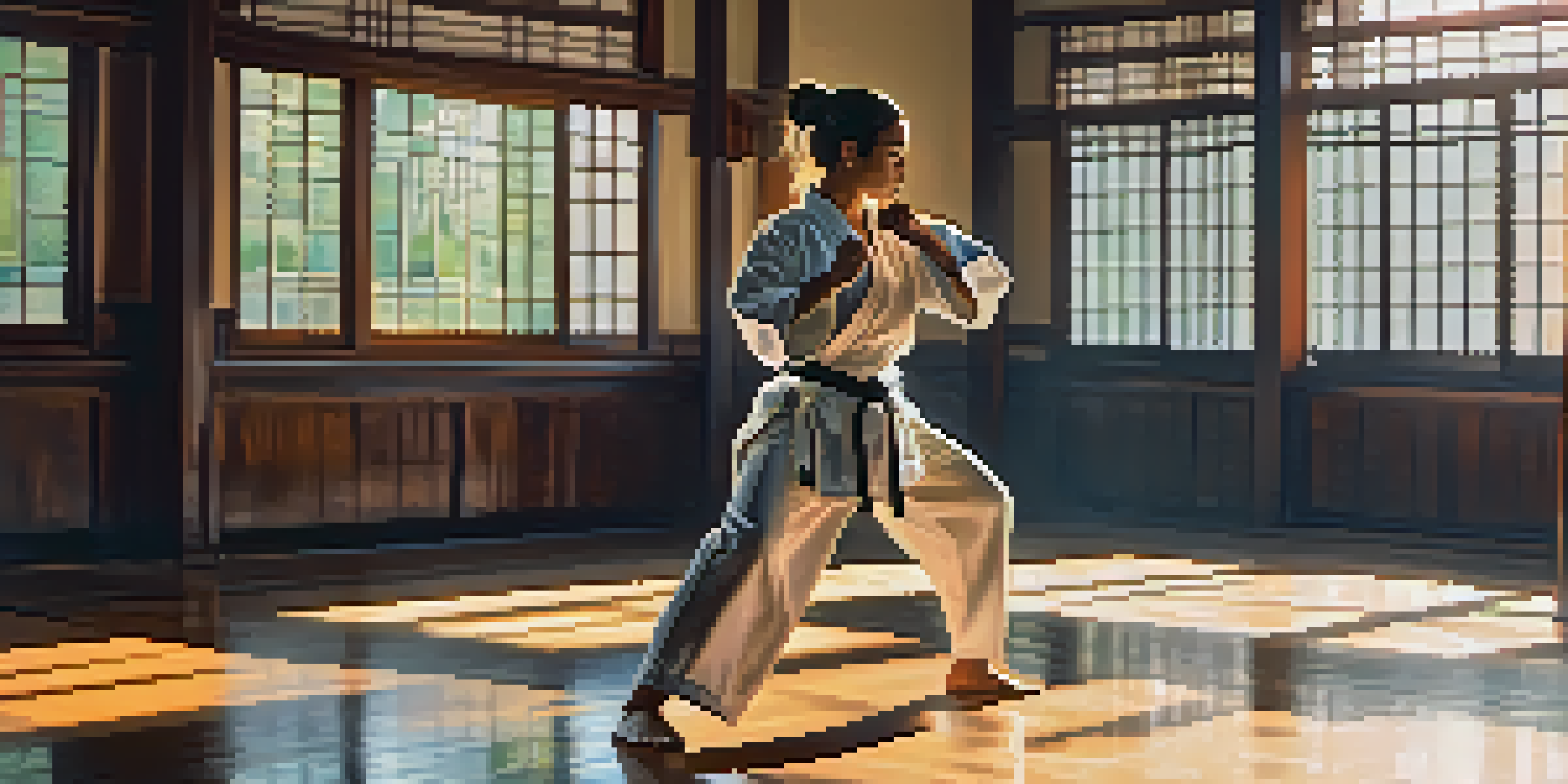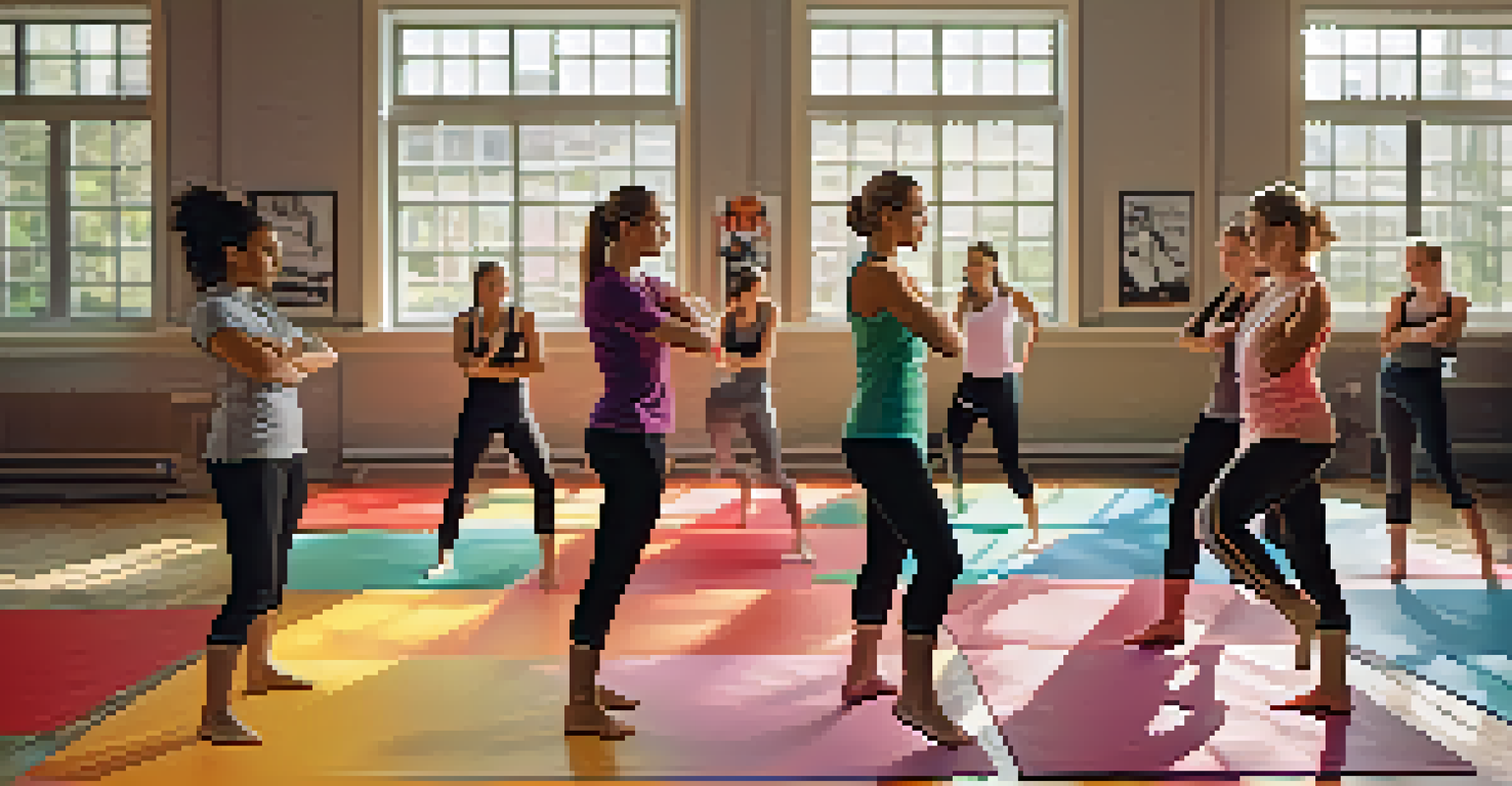Self Defense for Women: Techniques for Different Scenarios

Understanding the Importance of Self Defense for Women
Self-defense is not just about physical strength; it's about empowerment and awareness. For women, learning self-defense can provide a crucial sense of security in various situations. Understanding the importance of self-defense helps women feel more confident in their daily lives, whether they are walking alone at night or in a crowded space.
The best defense is a good offense.
Many women may face unwanted attention or aggression, making self-defense skills invaluable. These skills can transform fear into assertiveness, enabling women to handle situations calmly and effectively. Moreover, self-defense training often emphasizes the importance of prevention and awareness, which are key in avoiding potentially dangerous situations.
It’s essential to recognize that self-defense goes beyond techniques; it’s about mindset. A confident mindset can deter potential aggressors and increase your chances of staying safe. By understanding the importance of self-defense, women can take proactive steps towards protecting themselves.
Situational Awareness: The First Step in Self Defense
Situational awareness is the foundation of effective self-defense. It involves being aware of your surroundings and recognizing potential threats before they escalate. By developing this skill, women can identify suspicious behavior and take proactive measures to avoid dangerous situations.

Being aware of your environment means paying attention to the people around you and the possible escape routes. For example, if you notice someone following you, having an exit plan can make all the difference. This heightened awareness can also help you choose safer routes or avoid poorly lit areas.
Empowerment Through Self-Defense
Self-defense training not only provides physical skills but also boosts women's confidence and awareness in various situations.
Practicing situational awareness can be as simple as being mindful while walking or while on your phone. By reducing distractions and staying alert, you can better assess your surroundings. Remember, the goal is not to live in fear but to empower yourself to make informed decisions.
Verbal Self Defense: Using Your Voice as a Tool
Verbal self-defense is an essential skill that often gets overlooked. It involves using your voice to assert yourself and deter potential threats. A strong, confident voice can communicate your boundaries and command respect.
Self-defense is not just a skill; it's an attitude.
For instance, if you feel uncomfortable in a situation, clearly stating your discomfort can often diffuse tension. Phrases like 'Leave me alone,' or 'I don’t want any trouble,' can be effective in asserting your space. This approach can also attract attention from bystanders, which may deter an aggressor.
Practicing verbal self-defense can come in handy in various situations, from dealing with catcalling to confronting unwanted advances. Remember, your voice is a powerful tool for self-expression and protection. Harnessing it effectively can be a game-changer in self-defense scenarios.
Basic Physical Techniques for Self Defense
Learning basic physical techniques is a vital aspect of self-defense. While it's not necessary to become a martial arts expert, knowing a few key moves can empower women to defend themselves effectively. These techniques often focus on targeting vulnerable areas of an aggressor's body, such as the eyes, nose, and groin.
For example, a simple palm strike to the nose can be a quick way to create an opportunity to escape. Similarly, a knee strike to the groin can incapacitate an attacker long enough to make your exit. Practicing these techniques regularly can build muscle memory, so they come naturally in high-stress situations.
Situational Awareness is Key
Developing situational awareness helps identify potential threats early, enabling proactive measures for personal safety.
It's crucial to remember that the goal of physical self-defense is not to win a fight but to escape safely. Being aware of your surroundings and practicing these techniques can provide the confidence needed to act decisively when faced with danger.
Self Defense Tools: What to Carry and How to Use Them
In addition to physical techniques, carrying self-defense tools can enhance your safety. Items like pepper spray, personal alarms, and self-defense keychains can serve as effective deterrents. However, it’s important to familiarize yourself with how to use these tools properly.
For instance, if you choose to carry pepper spray, practice using it in a safe environment to ensure you can deploy it effectively when needed. Understanding the range and spray pattern can make a significant difference in a high-pressure situation. Similarly, a personal alarm can help alert others when you feel threatened.
While these tools can provide an extra layer of security, they should complement your self-defense training rather than replace it. Ultimately, being prepared and knowing how to use your tools can boost your confidence and increase your chances of staying safe.
Recognizing and Escaping Common Scenarios of Attack
Being able to recognize common scenarios of attack is crucial for effective self-defense. Many attacks happen in familiar places, such as parking lots or public transportation. Understanding how these situations typically unfold can help you develop strategies to avoid or escape them.
For example, if you find yourself in a crowded area and feel someone invading your personal space, trust your instincts. Move away, seek help, or position yourself near other people. Being aware of your surroundings allows you to react quickly and effectively when faced with a potential threat.
Verbal Skills Matter in Defense
Using a strong, assertive voice can effectively communicate boundaries and deter potential aggressors.
Escaping an attack often requires quick thinking and decisive action. Whether it’s creating distance, drawing attention, or using a physical technique, knowing how to respond can save your life. Practicing these scenarios in a self-defense class can help you feel more prepared and confident.
Building Confidence Through Self Defense Training
One of the most significant benefits of self-defense training is the boost in confidence it provides. As women learn techniques and practice scenarios, they begin to feel more empowered and capable in their ability to handle difficult situations. This newfound confidence often extends beyond self-defense and impacts other areas of life.
Moreover, self-defense training fosters a supportive community, where women can share experiences and build camaraderie. This shared journey not only enhances skills but also creates lasting friendships and support networks. Feeling part of a community can further reinforce the importance of self-defense and personal safety.

Ultimately, building confidence through self-defense training is a journey. The more you practice, the more skilled and empowered you become. Remember, confidence is not just about physical ability; it’s about believing in your right to feel safe and secure.